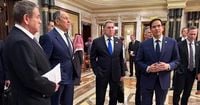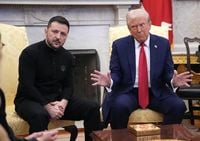President Donald Trump’s promises of a hasty end to the war in Ukraine faced a stark reality check on March 25, 2025, as officials from Russia reported that the recent ceasefire discussions with the United States concluded without a written agreement. The Kremlin is continuing its bombardment of Ukraine while U.S. and Russian negotiators were ideally aiming for a truce to put a brake on over three years of conflict sparked by Russia's invasion.
The talks, held in Saudi Arabia, lasted for 12 hours but ended with no accord, leaving stakeholders questioning the commitment to peace. Vladimir Chizhov, the first deputy chairman of Russia’s defense committee, criticized Ukraine’s stance during the negotiations, stating, “They seemed to have agreed on a joint statement; however this was not adopted due to Ukraine’s position,” on the state channel, Rossiya 24.
Despite a theoretical framework for a limited 30-day ceasefire, Russian President Vladimir Putin has imposed criteria that essentially demand a surrender from Ukraine, raising significant doubts about the sincerity of the negotiations. This skepticism is echoed in the ongoing conflict, with Kyiv beset by night-time drone assaults inflicting casualties and destruction.
Compounding this tension, Ukrainian authorities reported 101 injuries, including 23 children, from a recent airstrike on the city of Sumy. Additionally, Russian forces launched 139 drones overnight of Iranian design, with at least 78 being intercepted, though damage was reported across several regions, including Kharkiv, Sumy, and Kyiv.
Ukrainian Foreign Minister Andrii Sybiha expressed outrage, proclaiming, “Instead of making hollow statements about peace, Russia must stop bombing our cities and end its war on civilians.” He asserted that any diplomatic gestures must be “backed up by firepower, sanctions, and pressure.”
Amid this grim backdrop, Ukraine continues its retaliation, with the Russian Defense Ministry announcing the downing of a Ukrainian drone targeting a crucial oil pumping facility. The Kremlin characterized these strikes as a testament to Ukraine’s “inability to negotiate.”
In the midst of these complexities, the American perspective remains optimistic. U.S. officials believe the negotiations in Saudi Arabia were productive, despite reports of a breakdown in a separate ceasefire agreement in the Gaza Strip. Grigorii Karasin, an official from Russia's delegation, described the talks as “very useful,” indicating diplomatic channels remain open.
The broader context involves Trump's recent overtures aimed at a ceasefire, revealing a marked shift in U.S. strategy under his administration. In a separate interview, Trump acknowledged that territory and







